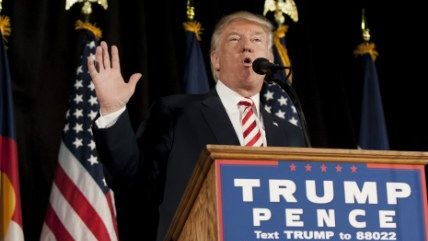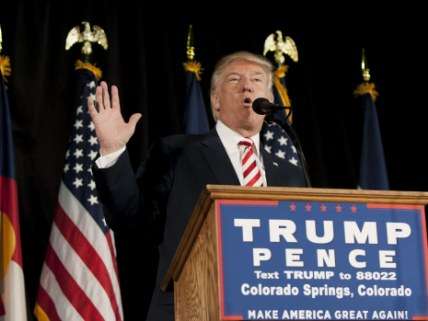Trump and the Lying Media
Candidate's bluster lacks foundation.


A couple of months ago, I had a nasty chore that I have to perform every so often. I had misquoted what a politician said in 1992, and a co-worker noticed the discrepancy. I wrote a correction, which my employer, the Chicago Tribune, promptly published.
Does making a mistake like that cause me pain? Well, yes, sort of like the pain I'd get from being bitten by a wolverine and then dousing the wound with Tabasco. But sometimes mistakes happen, and when they do, the Tribune makes a point of letting our readers know.
It's not hard to get a correction when a reputable newspaper gets something wrong. Wednesday's edition of The New York Times included 13. The Wall Street Journal had four. The Tribune had none, but it prominently featured a phone number and an email address, inviting readers to report errors.
Donald Trump tells voters the news media do not provide honest information. "They will attack you. They will slander you. They will seek to destroy your career and your family," he insists. "They will lie, lie, lie, and then again they will do worse than that."
Funny thing. As an opinion columnist, I've written dozens of columns disputing, contradicting, rebutting and even ridiculing him. I've met him and his campaign spokeswoman, Hope Hicks, and emailed with her.
Yet neither of them nor anyone else associated with his campaign has ever asked for a correction of anything I've written. If I'm one of the journalists lying about him, why don't they point out my false claims and force the newspapers that publish my columns to set the record straight?
Maybe they've been too busy meeting with his attorneys about the lawsuits he's planning. After The New York Times ran a story about two women who said he had sexually assaulted them, Trump threatened to sue for libel. His wife, Melania, threatened to sue People magazine after one of the alleged victims, a People writer, recalled a chat with her on the street.
Neither lawsuit will ever come to pass. If he were to sue the Times, Trump would have to undergo interrogation about these and other accusations. His ex-wives and girlfriends could be deposed. So could his children, his friends, his enemies and his employees, past and present.
From those depositions, the Times' lawyers might learn a lot of things that Trump would rather they didn't. In spite of all his bluster, Reuters reports, he hasn't sued a newspaper for libel since 1984—when he took the Chicago Tribune and its architecture critic to court for disparaging a skyscraper he had proposed. Trump lost and apparently learned a lesson.
It's harder for a public figure to win a libel suit than it is for a private individual, because the legal requirements are different. But even a famous person has only to prove that the newspaper published a false story that harmed his or her reputation and knew or should have known the story was false. (Melania Trump would have no chance suing People, because the offending passage, true or not, wasn't damaging.) Such lawsuits rarely get file –and even more rarely succeed—because news organizations hardly ever do what the defamation laws punish.
Trump's fulminations against the coverage of his campaign are equally hollow. He doesn't ask for corrections because, as a rule, there is nothing to correct.
Newspapers routinely acknowledge when they get facts wrong, because their credibility is all they have. Trump doesn't admit or retract falsehoods, because his falsehoods are deliberate.
PolitiFact has documented that 53 percent of his statements are entirely false and only 4 percent are entirely true. (For Hillary Clinton, the figures are 12 percent entirely false and 24 percent entirely true.)
He thinks the news media are biased against him. What they are really biased against is his flagrant, incessant lying about matters large and small.
Clinton has told her share of lies—which the news media have exposed. The difference is that her misstatements are limited in number and scope, while he emits a never-ending torrent of outlandish fictions, which he goes on repeating long after each one has been exposed. His approach is a repudiation of the very idea that factual reality matters, which happens to be a sacred tenet of honest journalism.
Trump spouts brazen misinformation every time he opens his mouth, and he resents being called on it. But when he makes war on the truth, he shouldn't be surprised to find the news media mounting a defense.
© Copyright 2016 by Creators Syndicate Inc.


Show Comments (21)